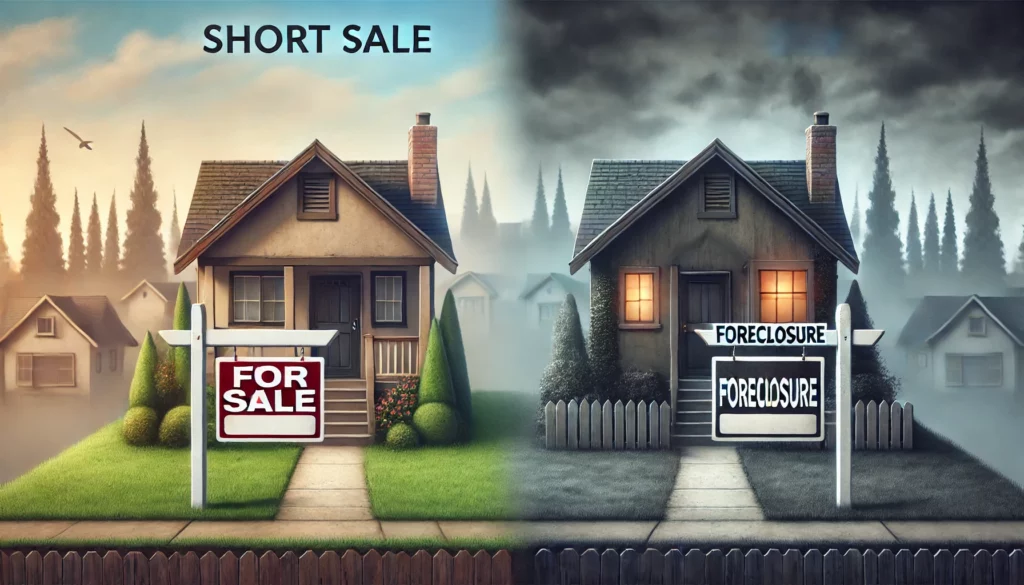Short Sale vs. Foreclosure – What’s the Difference?

Introduction
If you’re searching for “Short Sale vs. Foreclosure – What’s the Difference?” you’re likely feeling the weight of a difficult situation. Whether you’re struggling with financial hardship, falling behind on your mortgage payments, or facing potential foreclosure, you’re probably wondering about your options. You’re likely confused, stressed, and looking for a clear path forward. At this point, you might be asking: What’s the best way to handle my home before it’s too late? Should I sell my house in a short sale to avoid foreclosure? Or should I let the bank foreclose on my property and deal with the consequences later?
The core concern for you is likely how to best protect your financial future and emotional well-being while minimizing long-term damage. You’re seeking clarity on how each option works, how much they will cost you, and which one offers the best resolution for your specific situation. Understanding the differences between a short sale and foreclosure is critical for you to make an informed decision. This blog will guide you through both options, highlighting the pros and cons of each, and helping you weigh your choices.
Short Sale vs. Foreclosure: What’s the Difference?
When you’re facing financial difficulties and behind on your mortgage payments, the fear of losing your home can feel overwhelming. Understanding your options—like a short sale or foreclosure—can help you make an informed decision. While both choices involve selling your home under financial duress, they come with distinct implications. In this blog, we’ll break down the key differences between short sales and foreclosure, addressing your concerns about time, cost, and long-term consequences. We’ll also explore why selling your home for cash might be the best option for you, especially if you’re trying to avoid the damaging effects of foreclosure.
What is a Short Sale?
A short sale occurs when a homeowner sells their property for less than the remaining mortgage balance. Essentially, the bank agrees to take a loss on the loan and allows the home to be sold at a price lower than what is owed. While this can be a great option for homeowners facing foreclosure, it requires careful planning, approval from the lender, and a buyer willing to purchase the home at a reduced price.
The Process of a Short Sale
The short sale process can be long and complex, which is why it’s important to understand the steps involved. Here’s a breakdown:
- Eligibility: To qualify for a short sale, you typically need to prove that you’re experiencing financial hardship. This might be due to job loss, divorce, medical emergencies, or other unforeseen circumstances.
- Lender Approval: Before you can move forward with the sale, your lender must approve the short sale. This means submitting extensive documentation, such as proof of income, tax returns, and a letter of hardship.
- Selling Your Home: Once the lender approves the sale, you’ll need to work with a real estate agent to list your home. The bank may approve offers from buyers, but the final sale price must still be lower than your mortgage balance.
- Deficiency Judgment: In some cases, after a short sale, the lender might seek a deficiency judgment to collect the difference between the sale price and the mortgage balance. However, many states have laws that protect homeowners from this.
Pros of a Short Sale
- Less Damage to Your Credit: While your credit will still take a hit, a short sale typically has less of an impact than a foreclosure. According to Experian on Credit Impact, a short sale can decrease your credit score by 85 to 160 points, while a foreclosure can drop your score by 200 to 250 points.
- Avoiding Foreclosure: A short sale allows you to avoid the stigma and long-term financial damage of foreclosure.
- Potential Tax Benefits: In certain circumstances, the IRS may forgive any mortgage debt left unpaid after a short sale. However, tax laws vary, so it’s important to consult a tax advisor.
Cons of a Short Sale
- Time-Consuming: The approval process for a short sale can take months, leaving you in limbo. You may not have the luxury of time if your financial situation is urgent.
- Buyer Uncertainty: Since short sales require lender approval, there’s no guarantee that a buyer’s offer will be accepted. Buyers may also be hesitant to purchase a home with such uncertainty.
- Deficiency Judgment Risks: In some cases, lenders may pursue a deficiency judgment to recover the difference between the sale price and your mortgage balance. However, in many states, you can negotiate this with the lender before the short sale is finalized.
Conclusion and Transition to Foreclosure
If you’re looking to avoid the lengthy process and potential risks associated with a short sale, you might be wondering if foreclosure is a quicker option. Let’s look at how foreclosure works and why it might be the better—or worse—option for you.
What is Foreclosure?
Foreclosure is the legal process through which the lender takes ownership of your home after you’ve defaulted on your mortgage. It happens when you fail to make mortgage payments over a certain period of time, and the lender steps in to repossess the property. This process can have long-lasting consequences for your financial future.
For more valuable advice on avoiding foreclosure recovery scams and understanding the foreclosure process, visit the Consumer Financial Protection Bureau’s guide on how to avoid foreclosure.
The Process of Foreclosure
Foreclosure is typically a lengthy and drawn-out process, but it varies depending on state laws. In most cases, the following steps take place:
- Missed Payments: After missing a few payments, the lender will send a notice of default, warning you that your mortgage is in arrears.
- Public Notice: Once you’ve missed payments for an extended period, the lender will initiate public proceedings to take possession of the property. This typically involves a public auction of your home.
- Bank Sale: If the home is auctioned and no bids meet the minimum price, the lender may take possession of the property. It then becomes part of the lender’s real estate inventory and may be resold.
Pros of Foreclosure
- Immediate Relief: Foreclosure may allow you to stop paying the mortgage immediately and walk away from the property. This may feel like a relief if you’re struggling to make payments.
Cons of Foreclosure
- Severe Credit Damage: A foreclosure can severely damage your credit score, causing a drop of 200 to 250 points. This can make it difficult for you to obtain new credit, buy a home, or even rent in the future.
- Emotional Stress: Losing your home through foreclosure is a deeply emotional experience. Many homeowners report feeling stressed, anxious, and helpless during the process.
- Deficiency Judgment: If the bank sells your home for less than what you owe, it might pursue you for the difference. Depending on your state, this could result in a deficiency judgment that you’ll need to repay.
- Difficulty Finding Housing: After foreclosure, finding a new home to rent or buy can be very difficult, especially if your credit has taken a major hit.
Conclusion: Is Foreclosure Really the Best Option?
While foreclosure may seem like the only way out if you’re unable to afford your mortgage, it comes with significant financial and emotional costs. Your credit will suffer, and you may be liable for the remaining mortgage balance. It’s essential to explore other options, like a short sale or even selling your home to a cash buyer, before allowing foreclosure to happen.
To learn more about your options for avoiding foreclosure and understanding the impact of a foreclosure, be sure to check out our detailed page on How to Stop the Bank from Foreclosing on Your Vancouver WA House.
Why Selling Your Home for Cash May Be Your Best Option
If you’re in a position where a short sale or foreclosure seem too complicated, risky, or stressful, there’s an alternative that might be simpler and more beneficial—selling your home for cash. Unlike the lengthy process of a short sale or foreclosure, selling for cash can be fast, straightforward, and come with many advantages.
The Advantages of Selling Your House for Cash
- Quick Closing: Cash sales often close within a matter of days or weeks, allowing you to move on quickly without the uncertainty of a short sale or foreclosure.
- No Repairs Necessary: When selling for cash, you don’t have to worry about making costly repairs or upgrades to your property. Cash buyers are typically interested in purchasing homes as-is.
- Avoiding Foreclosure: If you’re facing foreclosure, selling your house for cash can allow you to settle your debt without the damaging effects of foreclosure on your credit.
- No Fees or Commissions: Unlike traditional sales, which require real estate agent commissions, a cash sale doesn’t involve any additional fees, allowing you to keep more of the sale proceeds.
Conclusion: The Best Option for You
If you’re looking for a hassle-free way to sell your home quickly and avoid the long-term financial repercussions of foreclosure or a short sale, selling your house for cash may be the solution you’re seeking. The process is straightforward, fast, and doesn’t come with the hidden risks that can accompany short sales or foreclosure.
Final Thoughts
When you’re faced with the difficult choice of either opting for a short sale or letting your home go into foreclosure, it’s crucial to weigh the pros and cons of each option. Both processes come with potential risks to your credit, emotional well-being, and financial future. However, by considering selling your house for cash to PineCone Properties, you can bypass many of these challenges, close the chapter on your property, and move forward without the burden of debt.
At PineCone Properties, we understand the stress and uncertainty that come with financial difficulties, and we’re here to help. Selling your house for cash to us can provide you with a quick, straightforward solution, allowing you to avoid the complications and risks associated with short sales or foreclosure. We offer fair cash offers, no commissions or hidden fees, and the ability to close on your timeline.
Understanding your options is the first step toward regaining control of your financial future. If you’re unsure of what the next step is, it might be time to reach out to us at us. Our team is ready to offer you a fair, no-obligation cash offer, helping you avoid the complications of short sales and foreclosures.
Let PineCone Properties be your partner in navigating this challenging time and getting the peace of mind you deserve.

